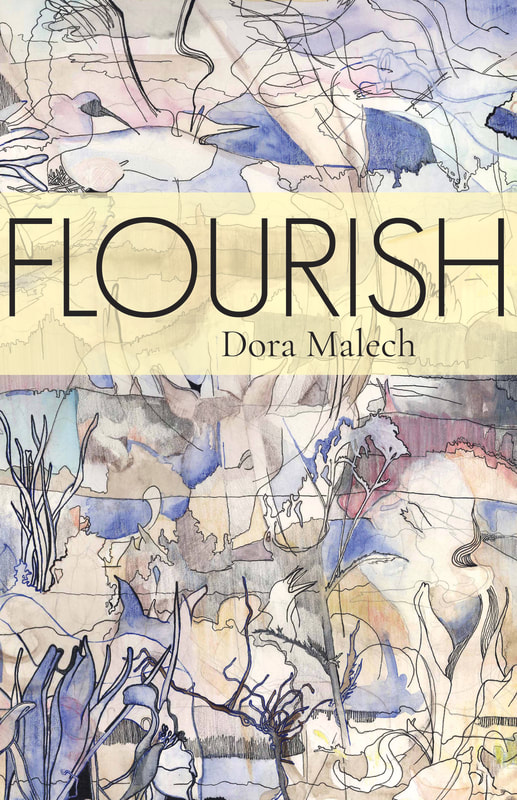 Even at its most intense, Blackford’s poetry never stops being warm, accessible and humorous. The Alpaca Cantos is beautifully presented with thick paper, careful layouts, with lovely drawings by artist Gwynneth Jones. These are poems that are both complex and simple, tragic and yet infused with delight and an almost impish joy in the day-to-day.
Even at its most intense, Blackford’s poetry never stops being warm, accessible and humorous. The Alpaca Cantos is beautifully presented with thick paper, careful layouts, with lovely drawings by artist Gwynneth Jones. These are poems that are both complex and simple, tragic and yet infused with delight and an almost impish joy in the day-to-day.
Category: Poetry Reviews
A review of Flourish by Dora Malech
 As in Bishop’s works, Malech seems to present some of her poems in utter simplicity, then surprises with the unexpected turn at the end. “Dear Reader” (p. 67) does this quite successfully. Some of the poems appear enigmatic, but when studied, reveal a coherent whimsy. “Come Again” (p.55) plays on the comedy of typos and “Euscorpius italicus” ( p.37) on the fear of spiders, both done with commendable control.
As in Bishop’s works, Malech seems to present some of her poems in utter simplicity, then surprises with the unexpected turn at the end. “Dear Reader” (p. 67) does this quite successfully. Some of the poems appear enigmatic, but when studied, reveal a coherent whimsy. “Come Again” (p.55) plays on the comedy of typos and “Euscorpius italicus” ( p.37) on the fear of spiders, both done with commendable control.
A review of Tricks of Light by Thaddeus Rutkowski
 Rutkowski ruminates on so many of the little things that usually escape notice. Three poems are devoted to a pet turtle. Imagine that, a turtle, the very definition of a slow-moving, boring thing. Yet in poems like “Turtle’s Cold Day,” we see Rutkowski actually worrying about the animal because of subtle anomalies in her behavior. In “Head Scratching” he observes that he knows why she stretches her legs – “to cool off.” But he’s puzzled by the reason behind her scratching her head. Could it be a mosquito?
Rutkowski ruminates on so many of the little things that usually escape notice. Three poems are devoted to a pet turtle. Imagine that, a turtle, the very definition of a slow-moving, boring thing. Yet in poems like “Turtle’s Cold Day,” we see Rutkowski actually worrying about the animal because of subtle anomalies in her behavior. In “Head Scratching” he observes that he knows why she stretches her legs – “to cool off.” But he’s puzzled by the reason behind her scratching her head. Could it be a mosquito?
A review of Girls Like Us by Elizabeth Hazen
 So many of these poems are littered with broken hearts and relationships gone sour, feelings of foreboding and loneliness and vulnerability. The second reference to “girls like us” comes in “Diagnosis III,” which highlights the incipient violence lurking everywhere. It begins: “Girls like you, he spat, / his breath laden with smoke / and Svedka….” It ends: “Girls like / you, he repeated, leaving me / a blank to fill.”
So many of these poems are littered with broken hearts and relationships gone sour, feelings of foreboding and loneliness and vulnerability. The second reference to “girls like us” comes in “Diagnosis III,” which highlights the incipient violence lurking everywhere. It begins: “Girls like you, he spat, / his breath laden with smoke / and Svedka….” It ends: “Girls like / you, he repeated, leaving me / a blank to fill.”
A Review of All My People Are Elegies by Sean Thomas Dougherty
 The writer ranges in subjects from friends long-dead to the pleasure of drinking tea, watching a sunset, or smelling your child’s hair. As Dougherty touches on these many subjects and themes, one is taken in by the compassion in his approach.
The writer ranges in subjects from friends long-dead to the pleasure of drinking tea, watching a sunset, or smelling your child’s hair. As Dougherty touches on these many subjects and themes, one is taken in by the compassion in his approach.
A review of Not What You Think by Clark Gormley
 For anyone who thinks poetry needs to be experimental, difficult, overly-complex, or high-blown, Not What You Think is the antidote. Gormley’s poetry book is a pleasure to read and even more of a pleasure to read aloud. If you’re able to catch Gormley performing his work, that’s the ideal, as these are poems that are not only able to be sung, but work perfectly accompanied by acoustic guitar and a wry vernacular, but they also work beautifully on the page.
For anyone who thinks poetry needs to be experimental, difficult, overly-complex, or high-blown, Not What You Think is the antidote. Gormley’s poetry book is a pleasure to read and even more of a pleasure to read aloud. If you’re able to catch Gormley performing his work, that’s the ideal, as these are poems that are not only able to be sung, but work perfectly accompanied by acoustic guitar and a wry vernacular, but they also work beautifully on the page.
A review of Stanley Park by Sapphira Olson
 I like to say that Stanley Park kept me reading with enthusiasm and intrigue, not only because of the pristine imagery, the hint of mythology and fantasy, the veiled politics, the sad and happy remembrances, but also because I, being such a romantic, I wanted to know if the two women, like the cliché says: lived happy ever after Stanley Park is a book about love a book to be loved.
I like to say that Stanley Park kept me reading with enthusiasm and intrigue, not only because of the pristine imagery, the hint of mythology and fantasy, the veiled politics, the sad and happy remembrances, but also because I, being such a romantic, I wanted to know if the two women, like the cliché says: lived happy ever after Stanley Park is a book about love a book to be loved.
A review of Praise Song For My Children by Patricia Jabbeh Wesley
 This book of poetry is part of Wesley’s mission to bear witness to the pain in her homeland. With her family’s good fortune to live in America, she writes of children in the poem, “This Is The Real Leaving,” that “They may never know / why I’m angry that there’s food in my fridge // while others starve.”
This book of poetry is part of Wesley’s mission to bear witness to the pain in her homeland. With her family’s good fortune to live in America, she writes of children in the poem, “This Is The Real Leaving,” that “They may never know / why I’m angry that there’s food in my fridge // while others starve.”
A review of Flowers, all sorts in blossom, figs, berries, and fruits forgotten by Oisín Breen
 The 95 page book contains only three poems, but they are grand, long, and epic, taking up space and working across time. Each of the poems relates to one another and are connected through the act described in the title of the first poem:“Isn’t the act of placing flowers on a tomb a gesture of bringing a little life back to the dead?” Taken collectively, the work is an elegy; a meditation on death and time, inheritance and love.
The 95 page book contains only three poems, but they are grand, long, and epic, taking up space and working across time. Each of the poems relates to one another and are connected through the act described in the title of the first poem:“Isn’t the act of placing flowers on a tomb a gesture of bringing a little life back to the dead?” Taken collectively, the work is an elegy; a meditation on death and time, inheritance and love.
A review of The House the Spirit Builds by Lorna Crozier, Peter Coffman and Diane Laundy
 Crozier sometimes finds nature in surprising things. She says, of “Key I”, “perhaps it is not a key but a long-thoraxed praying mantis about to grow legs and walk away.” Of Key II, she writes: “Is it called skeleton because it unlocks the mystery of bones?” Here “nature” is human nature, the human mind’s ability to free associate and make connections.
Crozier sometimes finds nature in surprising things. She says, of “Key I”, “perhaps it is not a key but a long-thoraxed praying mantis about to grow legs and walk away.” Of Key II, she writes: “Is it called skeleton because it unlocks the mystery of bones?” Here “nature” is human nature, the human mind’s ability to free associate and make connections.